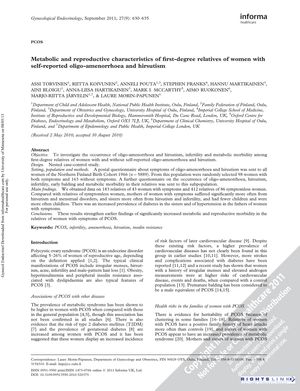Metabolic and Reproductive Characteristics of First-Degree Relatives of Women with Self-Reported Oligo-Amenorrhea and Hirsutism
October 2010
in “
Gynecological Endocrinology
”

TLDR Relatives of women with PCOS symptoms are more likely to have similar health issues.
The study focused on the prevalence of symptoms associated with Polycystic Ovary Syndrome (PCOS) among first-degree relatives of 98 women with oligo-amenorrhoea and hirsutism and 163 women without these symptoms. Data from 183 relatives of 43 symptomatic women and 412 relatives of 86 asymptomatic women revealed that mothers and sisters of symptomatic women were more likely to suffer from hirsutism, menstrual disorders, and infertility. Additionally, an increased prevalence of diabetes in sisters and hypertension in fathers of symptomatic women was observed. Despite limitations such as self-reported data and a small sample size, the study concluded that there is a higher risk of metabolic and reproductive disorders in the relatives of women with PCOS symptoms.






